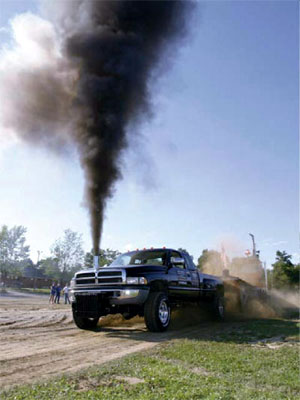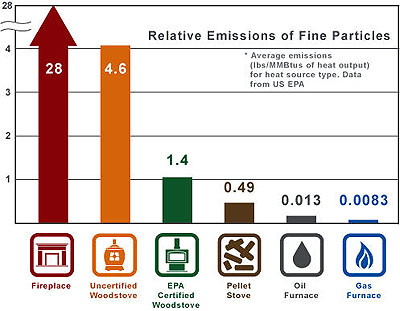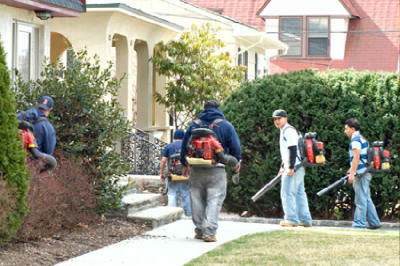There are three nasty sources of air pollution very close to home that nobody seems to recognize as a problem.
By Ted Mitchell
Published November 04, 2008
It seems that a day doesn't go by without hearing something about air quality. We now know that this is not just a nuisance problem. People die prematurely from air pollution, and research has shown the effects are oddly enough more on the heart than the lungs.
In residential areas, it is easy to be complacent because in general, air quality is pretty good for much of Hamilton. But there are three nasty sources of air pollution very close to home that nobody seems to recognize as a problem.
These are:
Now it is true that each of these sources is a small proportion of total pollution. But they are heavy hitters, ranking off the scale on a per mass basis. You could call this concept 'specific pollution', and it could be referenced to mass or energy content of fuel, power or heat output.
But let's not get too technical. We are really talking about pollution per person, and responsibility for that pollution.
To contribute more than your fair share of pollution, you can't be more guilty than by hiring a diesel backhoe to move some dirt around (the politically correct term is "landscape"), light a cozy fire after dinner, or blow some leaves and 2-stroke smoke around the yard.
Each of these is to a Hummer what a Hummer is to a bicycle. And all of them are entirely legal and off the radar of politicians.
The air quality index (AQI) is determined by measuring the concentration of pollutants in monitoring stations located around the province. They tend to be on the second or third story roofs of buildings, away from any nearby pollution source such as a busy intersection or an industry.
What they measure is an artificially low average that doesn't pick up point sources or mobile sources. But your lungs do pick up this pollution, especially when you spend time on a road or sidewalk. Or in your own back yard.

Photo redit: Fourwheeler.com
On-road diesel engines are undergoing a renaissance as a consequence of technology and regulation.
Particulate matter (PM) often comes with a subscript like 2.5 which refers to particle size in microns: smaller (fine) particles are more harmful to people. Diesels are the major source of fine PM in most areas without nearby heavy industry.
Diesel particulate is made of tiny particles of soot, with organic compounds stuck to them which deliver their characteristic smell. Some of these polycyclic organics are carcinogenic, but research has yet to determine how much this contributes to health effects.
Unfortunately, old diesel engines seem to last forever. This is a problem if public policy relies on fleet replacement to produce air quality improvements.
The other hole in regulations is off-road engines, which do not need to meet the same standards as their on-road counterparts. In fact the Canadian regs for 2008 permit about 26 times the PM emitted in an off-road diesel as compared to a similar engine in a heavy truck.
Since off-road diesels show up regularly in densely populated urban construction sites and residential areas, there is no argument for this lax exemption except maybe lobbying of the EPA from the usual suspects.

Photo credit: ECY
Cigarettes do not cause cancer because they are a vice. Nor is nicotine carcinogenic. What causes cancer are many of the polycyclic aromatic hydrocarbon products of incomplete combustion.
Wood smoke is chemically similar to tobacco smoke, and should be assumed to be carcinogenic. The few human health studies that exist, from third world countries, show that wood / biomass smoke is comparable to cigarette smoke in carcinogenicity.
Canada continues to ignore the US EPA's 1993 regulation requiring all new stoves and fireplaces to be clean burning. These certified stoves are typically 10-20 times cleaner than conventional wood burning devices.
During the February Upwind/Downwind Cconference, I spoke to an Environment Canada rep at their stove demonstration 'burn trailer'. He related a story about a woman who repeatedly complained about a neighbour's constant, choking wood smoke infiltrating her house. After several visits from the fire department and a court injunction, the stench stopped.
A few months later, she was talking to her neighbour. "No hard feelings, but thank you for stopping the smoke, it was really bothering me."
"But I didn't stop."
"What? But there's no more smoke!"
"I got a certified stove installed."
The difference really is that big.

Relative Emissions of Fine Particules (Image Credit: EPA
So with this technology readily available, it is puzzling why Canada still hasn't adopted this regulation for new wood heating units. There is however, extensive educational information online. How Canadian.
If nothing is done to retrofit existing units, or put some sensible restrictions in place, we are in for many stinky winter days for decades.
Ironically enough, some of the worst local air quality in Hamilton is not in the downtown but is caused by wood smoke in pretty little rural hamlets such as Mineral Springs. All you need is a wind-sheltered area, and a couple of homes heated frequently with damp wood and a rarely cleaned chimney and presto, downtown never smelled so clean.

Photo Credit: Baristanet
Recently I was engaged in an argument about pollution from on-road motorbikes. Regulations permit much higher emission concentrations than cars. The big difference between clean and dirty motorbikes is due to one thing – fuel injection, or the lack of it.
The other guy's argument was sure they have higher emission concentrations, but these bikes have small displacement and get better gas mileage so that cancels out the effect. As is turns out, motorbikes cannot be 'drive-clean' tested, so the argument could not be settled factually.
But there is one easy, overlooked test that combines emission concentration with displacement and mileage: when behind a vehicle, use your nose. If it stinks more, it is polluting more. What you smell is mostly hydrocarbons, but those are a surrogate for other harmful pollutants as well.
Speaking of stink, you can find small engines where there are green lawns. Their emissions remain essentially unregulated. Two stroke engines were the workhorse of Eastern Bloc countries.
The plastic Trabbi, once a symbol of the failure of Communism, contains the same engine technology that is now one of the darlings of the big box consumer set. They are cheap, stinky, noisy, and everywhere.
So much of Canadian environmental regulations are frustrating because they are complicated, expensive, generate understandable opposition, and are so ineffective compared to what is easily possible.
I believe it is time to start changing this sorry state of affairs, because health and quality of life are integral to a civilized society.
The obvious, responsible place to start is in our own back yards.
AQHI. The Air Quality Health Index is a work in progress, and combines the pollutants NO2, Ozone, and PM. It is intended to be used like the UV index.
Local forecast is now available for Burlington.
Diesel Emission Standards. Note the mixed metric/US 'engineering units' are generally incompatible and require some conversion.
By Frank (registered) | Posted November 04, 2008 at 10:42:47
Then I propose removing banana buses from the road. And all diesel Volkswagens... The frequency of use of a leaf blower is what 4 times in the fall? A Hummer would be driven everyday. So yes, per hour of use, your comparison would be correct, but pollution volume per year...i doubt it.
By jason (registered) | Posted November 04, 2008 at 19:00:36
I'd love to do a socialogical survey of people using leaf blowers. I saw a guy last week (on that really windy day) with his leaf blower. It took about 4 minutes for every leaf on the street to blow back on his lawn after he spent half an hour blowing them off. Pretty fascinating stuff.
I live behind the Real Estate Board office on York and they hire a 'landscaping' company that comes by every couple months with a whole pile of these things. In the summer the blow all the dust and dirt off of their parking lot over our backyard fences onto patio furniture, bikes etc.... in the fall they blow all the leaves off their parking lot over our fence and onto York. I saw a local resident yelling and screaming at them the last time they were there and he doesn't even live on our stretch. My neighbours and I are perplexed at 2 things:
Why in the world does a parking lot need to be blown clean of fine dust? Is it damaging the car tires??
Do they think they are being neighbourly by blowing the stuff over everyone's fence?? Heck, one of these days I'm going to get them to come over and blow off my backyard patio when they're done.
By jason (registered) | Posted November 06, 2008 at 09:03:37
ahh, good morning Strathcona. Nothing more enjoyable during my morning coffee than the sound of multiple leaf blowers (today these were the heavy duty ones that need to be pushed like snowblowers) and the sight of a blizzard of leaves flying onto my back patio thanks to the "landscaping" work being done at the real estate board. Let's hope for a big wind to pick up later on.
By Whoooooo (anonymous) | Posted November 06, 2008 at 22:31:00
Awesomeness, today at Gore Park a half-a-dozen city workers were marching along the walkway swinging their leaf blowers back and forth like they were a battalion of ghostbusters.
By geoff's two cents (anonymous) | Posted November 07, 2008 at 00:51:38
It's not just the air pollution caused by these things, but also the noise pollution. When we lived in New Westminster, BC, we would get woken up at least once a week a lot earlier than we wanted to by somebody conscientiously blowing leaves, dust, etc. for a good half-hour outside our apartment. What a pain! This is just a guess, but lawnmowers and leaf blowers probably have an adverse effect on urban/suburban songbird populations as well.
When it comes to mowing the lawn, I've found the manual mower to be a much more pleasant alternative (and hey, it's a bit of a workout too). Unless you're a senior citizen, nothing more is needed for an average-sized suburban lawn. As for leaves, rakes work wonders. Call me old-fashioned, but using these noisy, polluting machines is completely unnecessary 85% of the time. Any government looking for green policy initiatives might consider, in lieu of regulation, a hefty enviro tax on these things.
Thanks for the article, Ted!
By Grassroots are the way forward (registered) | Posted November 09, 2008 at 11:02:45
Why no mention of what is coming out of the various smokestacks of industry? Somehow I think that this is more detrimental than a wood stove, but that is my opinion. It seems you are promoting the oil and gas industry more then really defining why the air is bad.
So if we have a person who is homeless, then if they started a wood fire to warm themselves, that this is more hazardous then the poison coming from industry?
By D'oh (anonymous) | Posted November 09, 2008 at 13:53:37
rtfa 'grassroots are the way forward' -- "But there are three nasty sources of air pollution very close to home that nobody seems to recognize as a problem." so there are three important things here, the topic of the essay is 1) three sources of air pollution that are 2) very close to home and 3) not well recognized as a problem. no one is saying that smokestacks from industry aren't a problem but the point of this article is that their are other problems too.....problems we can do some thing about but don't get enough recognition, not sure why you feel need to pick a fight about it.
By Grassroots are the way forward (registered) | Posted November 09, 2008 at 21:09:32
D'oh: Was I picking afight, I don't think so, just pointing out an observance.
By geoff's two cents (anonymous) | Posted November 10, 2008 at 02:14:21
Grassroots, I think that if you read between the lines, you'll find in the article above a critique of the same middle-class, suburban, enviro-ethical complacence that - I believe/hope - is also at least partly the target of your own political ire.
All-out civil war abroad is arguably more detrimental than a single murder that happens at home. That doesn't necessarily mean that that single murder isn't worthy of our attention.
Furthermore, the average citizen on their own has a great deal more control over what products they choose to purchase for themselves, than over what big industry does. This, at least, makes the former issue worthy of discussion and our attention.
Finally nobody's blaming the homeless for anything here. However, focusing all of our angst on big industry strikes me as somewhat counterproductive when everyday people of middling income choose to consume the things that that industry produces. With this in mind, a discussion of the negative environmental impact that everyday purchasing decisions can have en masse strikes me as a good place to start when agitating for enviro-economic change.
By Ted Mitchell (registered) | Posted November 11, 2008 at 15:07:47
Thanks for the comments so far. It's important to note that industry is heavily regulated and monitored, and zoning generally protects people from living in the shadow of smokestacks.
Apart from those unfortunates in the steel mill shadow and near large intersections, Hamilton AQ is generally excellent, or would be if it weren't for these 3 sources that are entirely unregulated and do not bear a second thought from those who generate them.
Because these sources are highly localized, they do not register on AQI stations unless there is a temperature inversion (like the fireplace smoke on Christmas eve 2005) http://www.climate.weatheroffice.ec.gc.c... http://www.airqualityontario.ca/index.ph... search december 2005 for hamilton west.
Try this: next time you are downwind of your neighbour's smoky fireplace, take a fleece jacket and leave it out for about 5 seconds. Then hang it up inside and see how many days it takes to lose that smell!
As for the noise issue, I will cover that in an upcoming article.
By seancb (registered) - website | Posted November 11, 2008 at 15:22:00
By Frank: "So yes, per hour of use, your comparison would be correct, but pollution volume per year...i doubt it."
Running a leaf blower for an hour is equivalent to driving 560km in a car. Plus the leaf blower pollution is very localized (usually in densely populated areas). So yes, it is possible for small engines to be just as bad, or worse, than cars (of course it depends highly upon usage patterns):
By markb (anonymous) | Posted November 15, 2008 at 22:11:51
Interesting to see the comments surrounding small engine exhaust have centered around the leaf blower. Must be a seasonal thing. The more serious attention should be placed on gas mowers, a significantly greater evil than the leaf blower, again due to seasonal influences. The gas mower may have emissions comparable to a leaf blower, but its impact is greater on a neighbourhood during the lingering heat of an August day. At least the wind and rain patterns of a November day assist in the dissipation of particulate matter. It really should be illegal to operate a gas mower (or any gas powered small engine for that matter) when a smog day has been declared.
By cam (anonymous) | Posted February 10, 2011 at 23:35:18
Wow you people are first rate eggheaded hippies. Something you folks might not know is that about 80 percent of the trucking industry is made up of trucks with older diesel engines so if you had your way then all these small trucking companies and businesses would end up going out of business because there's few who can afford a brand new truck much less a whole fleet of them so then all of these businesses would end up going to the big corporations or overseas creating less jobs here, and besides that you probably wouldn't have about 90 percent of the things that you do have because about 99 percent of the things you have came on a truck at one point or another. Now for your wood fire places. How long do you think fire has been around? I'm guessing ever since the first knuckle draggin caveman accidentally scraped a piece of flint across a rock an ended up with a fire. So if wood smoke is so bad for the environment then how come the world isn't dead and barren by now? Besides that obviously none of you have been exposed to a fire for warmth its about a hundred times better than any other source of heat. People like you is the reason its so hard for the little guy to survive any more. And of your so worried about "noise" pollution then go live out in the country.
You must be logged in to comment.
There are no upcoming events right now.
Why not post one?